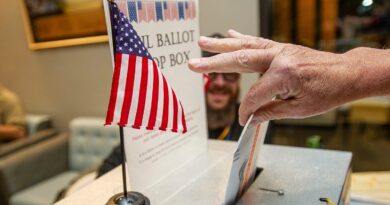Trump’s 2020 election lies are even worrying Marjorie Taylor Greene
Former President Donald Trump’s agenda to propagate the lie that the 2020 election was rigged against him has become an all-consuming obsession — and it reached a new high last week when he threatened to lead a Republican election boycott if the GOP is insufficiently attentive to it.
There are now some indicators that Trump’s strategy could backfire at the polls in 2022 and 2024, indicators substantial enough that even one of his staunchest allies, Rep. Marjorie Taylor Greene, R-Ga., is openly freaking out and taking a different line from him on election strategy.
According to a report Sunday in The New York Times, Greene recently commissioned an informal internal survey that found that “roughly 10 percent of Republican voters expressed a serious lack of confidence in the security of Georgia’s elections, with 4 percent saying they did not think elections were secure in Georgia and would not vote in future elections, and 6 percent saying they were unsure whether their votes would be counted.”
In her thread, Greene did something that previously seemed unthinkable: departed from the Trump line.
That’s potentially a worrying number for Republican elected officials, and a sign of how Trump’s 2020 disinformation fixation could corrode future turnout for the GOP. Ten percent of a party’s voters suggesting they don’t know whether voting is meaningful or are so mistrustful that they intend to shun the voting booth is a huge number — if similar numbers exist in battleground states and competitive districts across the country, that could spell disaster for Republicans.
Greene — the closest thing Trump has to a replica in Congress — lives in a very red district and doesn’t have much to worry about when it comes to her own re-election, but still she saw the survey’s results as alarming. On Monday she posted a thread on Twitter worrying about the finding of her poll.
“I recently conducted a poll on Georgia’s elections and if my constituents felt their votes would count during a teletown hall. Sadly, 4% said they won’t even vote due to voter fraud,” she tweeted. “This is WRONG. Legal votes by Rs are just as important as stopping illegal ones.”
In her thread, Greene did something that previously seemed unthinkable: departed from the Trump line. As she has in the past, she once again advanced false claims about the reliability of the 2020 election and falsely claimed that mail-in ballots are a tool for fraudulent voting. But she also emphasized the importance of voting, “Don’t sit at home and hand over the victory to Democrats. Flood the polls!” That’s a divergence from Trump’s edict the previous week that an election boycott might be in order if his conditions for investigating fraud aren’t met.
Greene went even further, implicitly criticizing Trump’s boycott threat. “Voices online that are telling you not to vote are doing the Democrats’ dirty work. Stop listening to grifters telling you not to vote,” she tweeted. “We must root out the fraud, but we also have to VOTE.” It’s not clear that Greene is implying that Trump himself is a grifter — she could be thinking about fringe right-wing activists — but she’s certainly arguing that his line of thinking is dangerous.
There are a number of reasons Greene’s finding isn’t necessarily an emergency for her party. This is a one-off, informal internal survey in one district — it’s not a number backed by proper polling methodology. And with more than a year until the midterm elections, that 10 percent of wary voters could diminish. There is also a difference between saying you’re doubtful of the point of voting and how you’re actually likely to act when Election Day comes. Lastly, it’s unclear based on one survey how many respondents felt voting was pointless before Trump’s rhetoric questioning the 2020 election results — it’s not uncommon for voters across the political spectrum to question the legitimacy of the voting process. So we can’t establish a causal link between Trump and these numbers.
Still, if one were to venture a bet on whether that 10 percent would shrink or increase over time, it wouldn’t be unreasonable to lean toward increase. Trump remains extremely popular in the party, and recent polls show that 40 percent of Republicans consider themselves more his supporters than supporters of the GOP. Trump has a famously short attention span as a politician, but his focus on casting aspersions on the integrity of the electoral system is only intensifying. He’s not only elevating it as a priority at rallies and in statements, he’s willing to hold the party hostage over it. The fact that Trump’s most obvious allies think he’s behaving recklessly should be a clue as to how costly and short-sighted this approach is.



